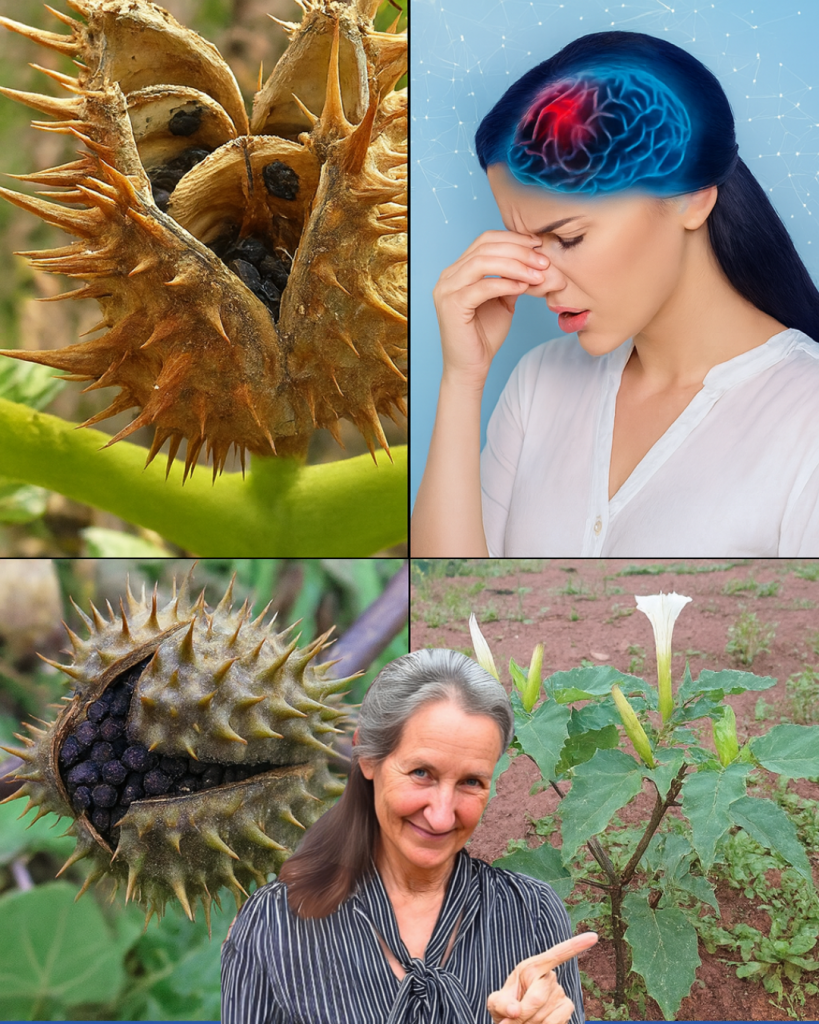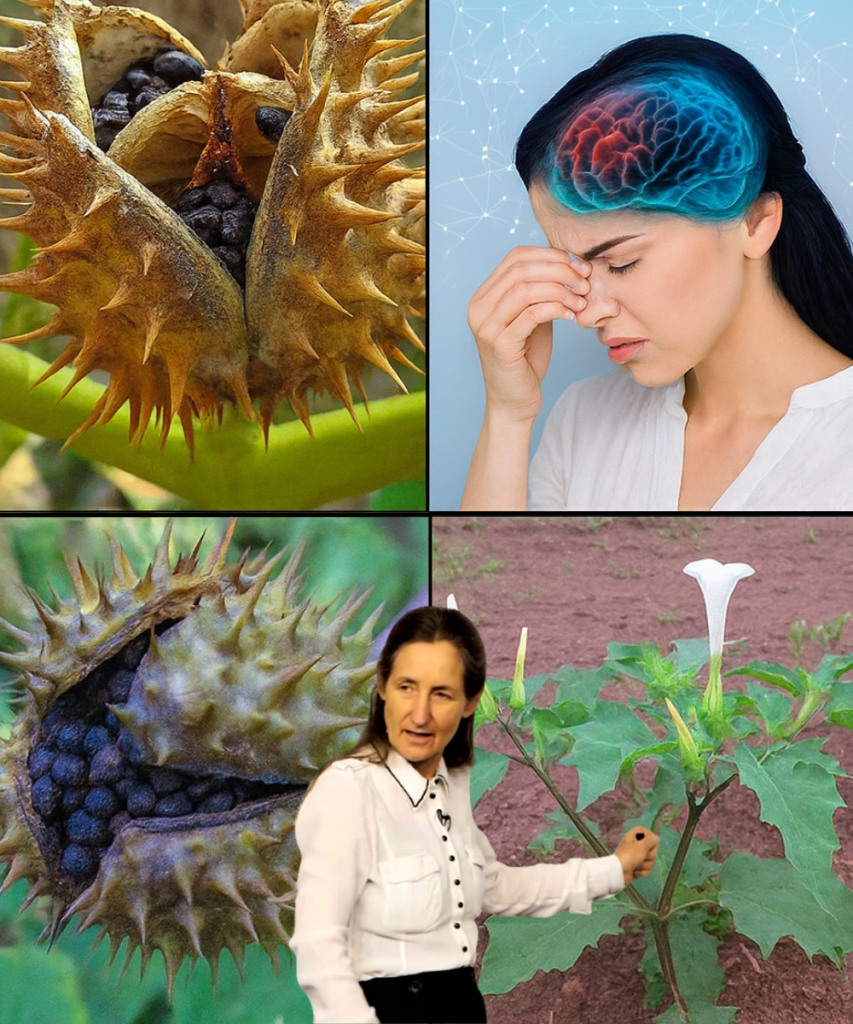🌙 Few plants captivate the imagination like Datura stramonium. Known as jimsonweed, devil’s trumpet, or thorn apple, this enigmatic herb has whispered secrets of healing and peril through centuries of human history. Its spiky pods and hauntingly beautiful flowers hide a potent blend of power and poison, revered by shamans and feared by the unwary. For wellness enthusiasts eager to explore nature’s remedies, Datura stramonium offers a mesmerizing glimpse into traditional plant medicine—but with a warning that demands respect. Ready to unravel the mystery of this alluring yet dangerous herb? Let’s dive into its ancient uses, modern insights, and the critical precautions you need to know.

What Is Datura Stramonium?
🌿 Datura stramonium is no ordinary plant. This fast-growing annual, native to North America but now thriving worldwide, commands attention with its jagged leaves, trumpet-shaped white or purple flowers, and prickly seed pods. Every part—seeds, leaves, flowers, and roots—brims with tropane alkaloids like atropine, scopolamine, and hyoscyamine. These compounds, while medicinally potent in controlled settings, make Datura one of nature’s most toxic herbs. Its dual nature as both healer and hazard has shaped its storied role in folk medicine and spiritual rituals across cultures.
A Glimpse into Datura’s Traditional Uses
🕉️ For centuries, Datura stramonium has been a cornerstone of traditional healing, wielded with reverence by skilled herbalists and shamans. Its use was never casual, always guided by strict rituals and deep knowledge due to its potent effects. Here’s how ancient cultures harnessed its power:
Respiratory Relief
🌬️ Inhaling the smoke from dried Datura leaves was a traditional remedy for asthma and bronchial discomfort. The alkaloids helped relax airways, offering relief from wheezing and shortness of breath.
Pain Management
🩹 Topical poultices made from crushed leaves were applied to soothe sore muscles, joint pain, or minor wounds, leveraging the plant’s analgesic properties.
Sedative and Dream Inducer
💤 In minute doses, Datura was used to promote deep relaxation or vivid dream states, often in ceremonial contexts to aid spiritual exploration.
Spiritual and Ritual Use
✨ From Native American tribes to African and Indian shamans, Datura was a sacred tool for inducing visions or connecting with the spiritual realm. These practices were tightly controlled, reserved for experienced practitioners who understood the plant’s risks.
These traditional uses highlight Datura’s potency, but they also underscore the expertise required to use it safely—something modern wellness seekers must take seriously.
How Datura Impacts the Body
🧠 The magic—and danger—of Datura stramonium lies in its tropane alkaloids, which act as anticholinergics. These compounds block acetylcholine, a neurotransmitter critical to muscle movement, memory, and digestion. In tiny, controlled doses, they’ve found a place in modern medicine:
Scopolamine
💊 Used in motion sickness patches and to reduce postoperative nausea, scopolamine calms the nervous system and prevents dizziness.
Atropine
❤️ A lifesaver in emergency medicine, atropine boosts heart rate during cardiac events and dilates pupils for eye exams.
Hyoscyamine
🍃 This alkaloid soothes gastrointestinal spasms, offering relief for conditions like irritable bowel syndrome.
But outside clinical settings, Datura is a wildcard. Even a small miscalculation in dosage can trigger severe symptoms, including dry mouth, blurred vision, rapid heartbeat, confusion, hallucinations, delirium, or loss of consciousness. In extreme cases, ingestion can be fatal, making Datura a plant to admire from a distance, not to experiment with at home.
Modern Science: A Cautious Exploration
🔬 While Datura stramonium is too risky for casual use, its alkaloids continue to intrigue researchers. Modern science has harnessed its compounds for specific medical applications, always under strict regulation. Ongoing studies explore their potential in:
Neurological Disorders
🧠 Scopolamine and atropine show promise in understanding brain function and treating conditions like Parkinson’s disease or epilepsy.
Pain Management
🩺 Researchers are investigating whether Datura-derived compounds could lead to new analgesics for chronic pain, though results are preliminary.
Gastrointestinal Relief
🍵 Hyoscyamine’s ability to relax smooth muscles makes it a candidate for treating digestive disorders, but only in purified, controlled forms.
These studies emphasize one thing: Datura’s benefits are locked behind laboratory precision. For the average person, the risks far outweigh any potential rewards.

Why Safety Is Non-Negotiable
⚠️ Datura stramonium is not a plant to trifle with. Its narrow therapeutic window—the gap between a beneficial dose and a toxic one—makes it unsuitable for home remedies. Here’s what you need to know to stay safe:
Avoid Unsupervised Use
🚫 Never consume, apply, or inhale Datura without guidance from a licensed herbalist or medical professional. Even small amounts can cause severe reactions.
Protect Vulnerable Loved Ones
🐶 Keep Datura plants out of reach of children and pets, who are especially sensitive to its toxins. If it grows wild near your home, consider removing it.
Skip DIY Preparations
🧪 Homemade teas, tinctures, or salves are a recipe for disaster. The alkaloid content varies widely, making safe dosing nearly impossible.
Act Fast in Emergencies
🏥 Accidental exposure or ingestion requires immediate action. Call Poison Control (1-800-222-1222 in the U.S.) or seek emergency medical care if symptoms like confusion or rapid heartbeat appear.
In the U.S., Datura stramonium is legal to grow but not approved by the FDA for herbal use. Responsible herbalists steer clear, and so should you.
Safer Alternatives for Wellness
🌱 Drawn to Datura’s traditional benefits? You can achieve similar results with gentler, safer herbs that don’t carry the same risks. Explore these well-studied options:
Mullein for Respiratory Health
🌬️ Soothes lungs and eases coughs without the toxicity of Datura.
Valerian Root for Relaxation
💤 Promotes restful sleep and calms nerves, perfect for stress relief.
Chamomile for Digestion
🍵 Soothes upset stomachs and reduces nervous tension naturally.
Peppermint for Headaches
🌿 Eases mild headaches and supports digestion with a refreshing flavor.
Lavender for Stress Relief
🌸 Calms the mind and body, ideal for relaxation and sleep support.
These herbs are widely available, beginner-friendly, and backed by centuries of safe use.
Embrace the Wisdom, Avoid the Risk
🌟 Datura stramonium is a botanical enigma—a plant of profound power and perilous potential. Its history in traditional medicine and spiritual practices is a testament to humanity’s ingenuity, but its toxicity demands unwavering caution. For wellness seekers, Datura offers a lesson in respecting nature’s complexity rather than a practical remedy. Safer, equally effective herbs can support your health goals without the dangers.
By understanding Datura’s allure and risks, you’re empowered to make informed choices about plant-based wellness. Curious about other natural remedies? Dive into our collection of health articles for safe, inspiring ways to nurture your body and mind. Share your thoughts or questions below—let’s keep the conversation growing!









